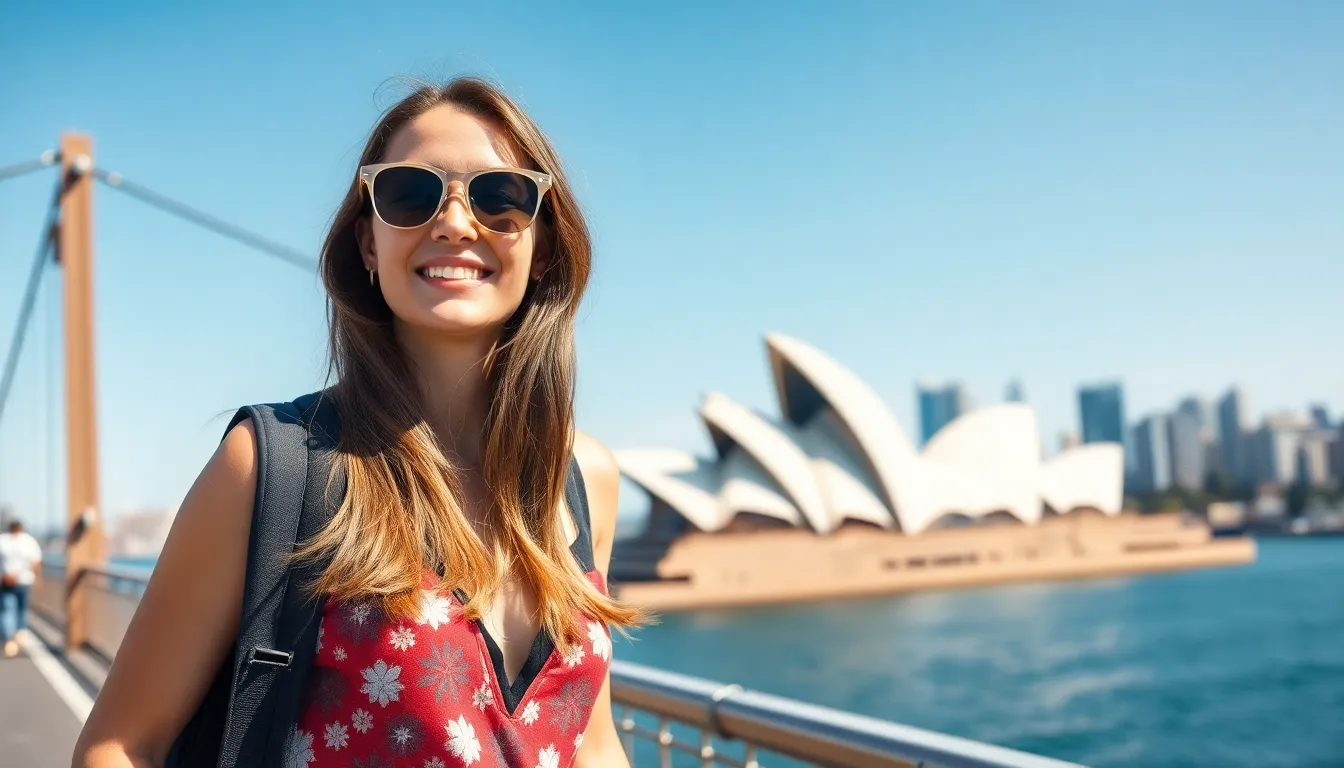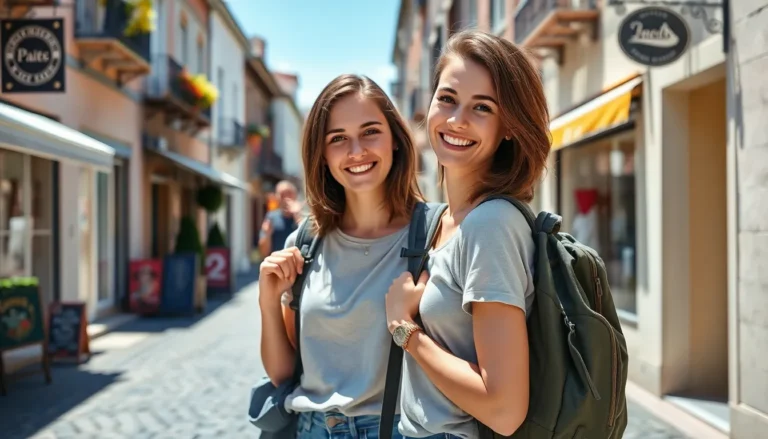Australia beckons solo travelers with its stunning landscapes and vibrant culture. From the sun-kissed beaches of the Gold Coast to the rugged outback of the Northern Territory, this vast continent offers endless adventures for those exploring on their own. It’s a land where the spirit of adventure thrives, making it an ideal destination for anyone looking to connect with nature and themselves.
Traveling solo in Australia not only provides the freedom to craft a personalized itinerary but also opens doors to unique experiences. Whether it’s diving in the Great Barrier Reef or hiking through the ancient rainforests of Tasmania, solo travelers can immerse themselves fully in the beauty and diversity of this extraordinary country. With a welcoming atmosphere and plenty of resources for solo adventurers, Australia promises a journey filled with unforgettable memories.
Table of Contents
ToggleOverview of Solo Travel In Australia
Solo travel in Australia offers a blend of solitude and adventure, making it a desirable choice for many. Australia’s diverse landscapes, from beaches to mountains, invite exploration. Travelers can choose self-guided tours or join group excursions for companionship.
Safety remains a primary concern for solo travelers. Australia’s low crime rates and well-maintained infrastructure contribute to a secure environment. Public transportation options, such as buses and trains, provide easy access to major attractions, ensuring convenience for solo adventurers.
Accommodations cater to solo travelers, with hostels, hotels, and Airbnb options available in urban and rural areas alike. Many hostels encourage social interaction, allowing visitors to meet fellow travelers.
Engagement opportunities abound, from cultural festivals to outdoor activities. National parks, including Kakadu and the Blue Mountains, present chances for hiking and wildlife observation. Local tours, like wine tastings in the Barossa Valley, facilitate connection with local culture.
Overall, Australia provides an enriching experience for solo travelers seeking adventure, safety, and a chance to discover themselves in a stunning setting.
Planning Your Solo Adventure

Planning a solo adventure in Australia involves careful consideration of destinations and timing. Proper preparation ensures a fulfilling and safe experience.
Choosing the Right Destinations
Selecting destinations that match personal interests enhances the solo travel experience. Popular locations include:
- Sydney: Offers iconic attractions like the Sydney Opera House and Sydney Harbour Bridge, alongside vibrant nightlife and a diverse culinary scene.
- Melbourne: Known for its arts, culture, and trendy neighborhoods, Melbourne hosts numerous festivals and events year-round.
- Cairns: Serves as a gateway to the Great Barrier Reef, ideal for snorkeling, diving, and enjoying tropical weather.
- Tasmania: Provides stunning national parks and hiking opportunities, with pristine landscapes and unique wildlife.
- Gold Coast: Features beautiful beaches and theme parks, perfect for relaxation and adventure.
Clarifying travel goals influences destination choice. Whether seeking adventure, culture, or nature, Australia offers a variety of locations to explore.
Best Times to Visit
Timing impacts the overall travel experience in Australia. Key seasons include:
- Summer (December to February): Delivers warm weather and longer days, attracting beachgoers and outdoor enthusiasts but may also bring higher tourist traffic.
- Autumn (March to May): Provides mild temperatures and fewer crowds, ideal for exploring cities and engaging in outdoor activities.
- Winter (June to August): Features cooler temperatures, particularly in the south, but offers unique experiences like whale watching along the coast.
- Spring (September to November): Showcases blooming flowers and wildlife, perfect for nature lovers and outdoor adventures.
Researching common weather patterns helps determine the best experience. Understanding peak tourism periods also aids in planning to avoid crowded attractions.
Safety Tips for Solo Travelers
Prioritizing safety enhances the solo travel experience in Australia. These tips address key areas to ensure a secure journey.
Staying Safe in Urban Areas
- Stay alert: Remain aware of surroundings and keep personal belongings secure. Use a crossbody bag or money belt to deter theft.
- Choose accommodations wisely: Opt for well-reviewed hostels, hotels, or Airbnb options located in safe neighborhoods. Check recent guest reviews for up-to-date safety experiences.
- Use reputable transportation: Rely on established public transport systems or rideshare services like Uber. Avoid unlicensed taxis and isolated public transport routes at night.
- Keep emergency contacts accessible: Save important contact numbers on a phone and carry a physical copy. This includes local emergency services and accommodation addresses.
- Limit alcohol consumption: Drink responsibly to maintain situational awareness. Avoid accepting drinks from strangers.
Outdoor Safety Considerations
- Research locations beforehand: Understand the specific requirements and challenges of any outdoor activities planned. Check the weather, entry fees, and any health advisories.
- Share your itinerary: Inform a friend or family member of travel plans, including hikes or outdoor adventures. Regular check-ins improve safety.
- Carry essential supplies: Pack water, snacks, a first-aid kit, and a charged phone for emergencies. Consider carrying a portable charger if venturing into remote areas.
- Follow marked trails: Stay on established paths when hiking to reduce the risk of getting lost. Familiarize yourself with trail maps before departure.
- Be wildlife aware: Learn about local wildlife and potential hazards, such as snakes or spiders. Keep a safe distance from wild animals and do not feed them.
Budgeting for Solo Travel
Budgeting remains a crucial aspect of solo travel in Australia. Careful financial planning enhances the experience and allows for memorable adventures.
Accommodation Options
Accommodation choices vary significantly across Australia. Hostels provide affordable rates and opportunities for socializing, often costing between $25 and $50 per night. Hotels range from budget options at around $100 per night to luxury stays exceeding $300 per night. Airbnb can be a versatile option, with prices varying by location, ranging from $80 to over $200 per night. Prioritize locations near public transport and attractions to minimize extra travel costs.
Transportation Tips
Transportation costs influence the overall travel budget. Domestic flights can be economical for long distances, with fares typically between $50 and $150 if booked in advance. Buses serve as a budget-friendly option for reaching major cities, with tickets often around $30 to $100 based on distance. Train travel, while scenic, tends to be pricier, so travelers should look for deals. Local public transport offers economical solutions for getting around cities, with daily passes generally priced at $10 to $15. Consider purchasing a vehicle for extended road trips, as it enables exploration at a more relaxed pace, with fuel costs averaging $1.50 per liter.
Engaging with Locals
Connecting with locals enriches the solo travel experience in Australia. Engaging with the culture and community encourages deeper insights into the country’s diverse lifestyles.
Cultural Etiquette
Understanding cultural etiquette is essential for solo travelers in Australia. Respect for personal space is important, as Australians value their privacy. When interacting, using friendly greetings, such as “G’day,” fosters a warm atmosphere. Active listening is crucial during conversations, as it signifies respect and interest in local stories. Tipping is not expected but appreciated, typically around 10% in restaurants for excellent service. Learning a few Australian slang terms enhances communication and shows effort in engaging with the local culture.
Solo Travel Meetups and Communities
Participating in solo travel meetups and communities offers opportunities for connection. Numerous platforms exist where solo travelers can find events, such as Meetup.com or Facebook groups dedicated to travel in Australia. Activities may include group hikes, city tours, or dinners, facilitating friendships with both locals and fellow travelers. Hostels often organize social events, creating an ideal environment for mingling. Local cafes or co-working spaces frequently host community gatherings, inviting solo travelers to connect while enjoying Australia’s vibrant atmosphere.
Solo travel in Australia offers a unique blend of adventure and self-discovery. With its stunning landscapes and vibrant culture, travelers can immerse themselves in experiences that resonate deeply. The country’s safety and welcoming atmosphere make it an ideal choice for those venturing alone.
By engaging with locals and exploring diverse destinations, solo adventurers can create unforgettable memories. Whether it’s diving in crystal-clear waters or hiking through lush rainforests, each journey promises personal growth and connection. With thoughtful planning and an open mind, anyone can embrace the freedom of solo travel in this remarkable land.


